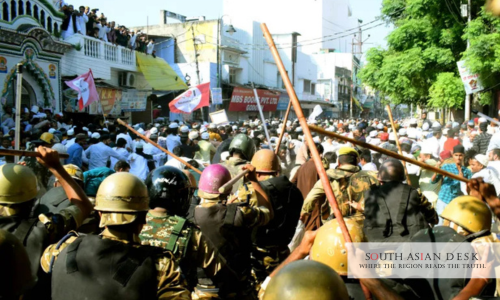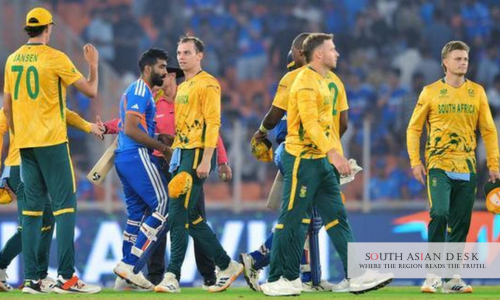Indian authorities have launched prosecutions against over 2,500 Muslims since September 2025 for chanting or displaying “I love Muhammad” during Eid Milad-un-Nabi celebrations, citing threats to public order and communal harmony. The actions, concentrated in Uttar Pradesh, involve arrests, FIRs under hate speech laws, and property demolitions. Why is India prosecuting Muslims in this manner? Officials claim the slogan incites enmity, but critics call it suppression of religious expression. The crackdown began in Kanpur on 4 September and spread nationwide, with protests India-wide drawing thousands.
This story underscores deepening religious fault lines in India, home to the world’s third-largest Muslim population of about 200 million. In South Asia, where cross-border ties with Pakistan and Bangladesh hinge on minority rights, such events fuel narratives of majoritarian overreach. They risk broader instability, as diaspora communities and regional media amplify outrage, potentially straining diplomatic relations and investor confidence in a key economic hub.
Spark of the Controversy in Kanpur
The row ignited on 4 September 2025 in Syed Nagar, a Muslim-majority area of Kanpur, Uttar Pradesh. Residents erected an illuminated banner reading “I love Muhammad” with a heart symbol as part of Eid Milad-un-Nabi decorations. Local Hindu men objected, sparking a standoff that lasted hours. Police removed the banner that night after intervention.
Next day, during the procession, police accused Muslim participants of tearing a Hindu banner, though witnesses dispute this. On 10 September, Uttar Pradesh police filed a First Information Report (FIR) against nine named Muslims, including a religious scholar, and 15 unidentified others. Charges invoked sections of the Indian Penal Code for promoting enmity between groups and outraging religious feelings.
Kanpur police stated the action aimed to prevent “disturbance of communal harmony.” A resident, aged 28 and facing charges, told reporters: “We had official permission for the decorations. Everyone has the right to practise their religion under the constitution.” His lawyer, MA Khan, added: “Many of those named were not even present in the procession.”
This incident set the tone for why is India prosecuting Muslims over a phrase of devotion. Similar FIRs followed in Meerut, where five men faced arrest on 4 October for a poster in Mawana town, prompting increased patrolling to curb rumours.
Protests India-Wide Escalate Tensions
News of the Kanpur FIR spread rapidly, igniting protests India across states. On 21 September, Maulana Tauqeer Raza Khan, head of the Ittehad-e-Millat Council, called for demonstrations in Kanpur and Bareilly after Friday prayers on 26 September. Though the council later cancelled, crowds gathered anyway.
In Bareilly, headquarters of the Barelvi Sunni sect, thousands assembled near a historic Muslim shrine post-prayers. They carried “I love Muhammad” posters and chanted against police actions. District officials deemed the march unauthorised. Protesters allegedly pelted stones and vandalised property, leading to a baton charge. Police arrested 89 people, including Khan.
Uttar Pradesh police reported identifying over 500 involved in what they termed a “pre-planned conspiracy.” Internet services shut down in Bareilly to quell unrest. Protests India extended to Lucknow, where over a dozen demonstrators outside the state assembly held placards and faced brief detention.
Sumaiya Rana, daughter of poet Munawwar Rana and protest organiser in Lucknow, said: “Police are registering cases against Muslims across the nation to suppress their legitimate protests. The BJP government wants to instil fear so Muslims lose the courage to speak for their religious and fundamental rights.”
Nationwide, at least 22 FIRs named more than 2,500 individuals. In Saharanpur, a man faced detention on 27 September for holding posters outside a mosque. Rights group Association for Protection of Civil Rights (APCR) secretary Nadeem Khan noted: “Authorities have treated a slogan expressing love for the prophet as a criminal act and described it as provocative.”
Uttar Pradesh Muslims Arrested in Dozens of Cases
Uttar Pradesh Muslims arrested in waves followed the Bareilly clashes. On 27 September, seven others joined Khan in custody over the unrest. Police invoked charges of unlawful assembly and rioting. In total, hundreds faced bookings in the state alone, with cases filed under laws against hate speech and public order threats.
A Bareilly lawyer, Zia Jillani, representing some accused, highlighted vulnerabilities: “Most of those arrested or facing charges belong to the marginalised sections of society and earn on a daily wage basis. For them, due process is an unbearable task. This kind of hate politics preys on the poor.”
Opposition leader Mata Prasad Pandey of the Samajwadi Party criticised the government: “The government talks of democracy but acts in complete disregard of it.” His party claimed blockage from sending a delegation to Bareilly.
SQR Ilyasi of the All India Muslim Personal Law Board asserted: “Expressing love for the prophet is our right.” Activist Vandana Mishra of People’s Union for Civil Liberties added: “The authorities frequently allow the Hindu community to raise religious slogans freely, while the minority faces arrest.”
These Uttar Pradesh Muslims arrested in cases underscore why is India prosecuting Muslims for acts seen as devotional. Data from police logs, as reported, show over 2,500 charged nationally, with Uttar Pradesh accounting for the bulk.
India Bulldozer Justice Targets Properties
India bulldozer justice emerged as a stark tool in the response. In Bareilly, a banquet hall owned by one accused faced demolition days after the 26 September protest. Officials claimed it targeted illegal construction, but timing raised eyebrows.
Chief Minister Yogi Adityanath, speaking in Lucknow on 27 September, referenced the action: “Sometimes, people are not able to shun their bad habits easily. For that, some denting-painting is required. You saw that in Bareilly yesterday. A maulana forgot who is in power.”
He described the unrest as a “well-orchestrated attempt” to disturb harmony. The Uttar Pradesh government’s Information Department echoed this, calling it a “well-planned conspiracy” to sabotage development like the Noida International Trade Show.
Bulldozer actions, common in BJP-ruled states since 2017, target properties of those accused of crimes, often bypassing courts. India’s Supreme Court recently banned such “bulldozer justice” as extralegal punishment. Yet, incidents persist, devastating Muslim-owned homes and businesses.
Nadeem Khan of APCR warned: “In many cases, the administration violated due process in registering cases and demolishing the properties of the accused, which has severe social and economic impacts on Muslim communities.”
In response, BJP Youth Morcha in Lucknow erected posters reading “I Love Adityanath” and “I Love Bulldozer” on 27 September, escalating rhetoric.
Background: A Pattern of Religious Policing
The “I love Muhammad” campaign traces to countering perceived Islamophobia, but clashed with local sensitivities in Uttar Pradesh. The state, with 38 million Muslims (19% of population), has seen heightened scrutiny under Adityanath’s tenure. Since 2017, his administration prioritised “zero tolerance” for unrest, often linking festivals to potential violence.
Earlier, Hindu festivals like Ram Navami used the same Kanpur site without issue, per locals. Mohit Bajpayee, a Hindu resident involved in the initial objection, clarified: “No objection to the text itself… but against new traditions in established locations.”
This context explains why is India prosecuting Muslims amid claims of equal rights. Protests India reflect broader grievances over selective enforcement.
What’s Next: Legal Battles and Simmering Unrest
Courts may review the FIRs, with petitions challenging due process. Adityanath vowed: “We will teach a lesson so strong that generations will forget to riot.” Yet, Maulana Tauqeer Raza Khan, from custody, warned pre-arrest: “Attempts to suppress our religious sentiments will backfire.”
As festivals approach, police boost patrols. Rights groups urge intervention to prevent escalation. Why is India prosecuting Muslims remains a flashpoint, with potential for more protests India if demolitions continue.
In conclusion, the crackdown highlights why is India prosecuting Muslims for expressions of faith, testing constitutional secularism in a diverse nation.
Published in SouthAsianDesk, October 21st, 2025
Follow SouthAsianDesk on X, Instagram, and Facebook for insights on business and current affairs from across South Asia.






